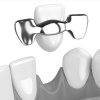Sensitive Teeth & Gums
Sensitive teeth are an extremely common problem your Springfield dentist regularly encounters. Many Americans suffer from this condition and it occurs most frequently when you eat or drink something hot, cold, sweet or sour. A burst of cold air can even set it off and the pain can be shockingly sharp and sudden.This condition is caused by the gums being pulled back to expose the surface beneath your teeth. Called dentin, this soft layer makes up the inner part of tooth, which includes the roots. Inside the roots there are thousands of tiny tubules that connect to the pulp or the tooth’s nerve center. These pathways carry allow sensations to reach the nerve in your tooth and that is what causes the pain.
What Causes Sensitive Teeth? 
There are a number of reasons people experience sensitivity such as:
- Brushing too hard or using a hard-bristled toothbrush
- Tooth decay near the gum line
- Gum disease
- Chipped or broken teeth
- Teeth grinding
- Tooth whitening products
- Age
- Plague buildup
- Acidic foods
- Dental work
What Can Be Done for Sensitive Teeth?
Thankfully there are many ways to reduce tooth sensitivity such as:
- Brush, floss and rinse regularly. Rinse with a fluoride and antiseptic mouthwash daily
- Use a soft-bristled tooth brush
- Use toothpaste for sensitive teeth
- Avoid lots of highly acidic foods and drinks
- Use fluoridated dental products
- Don’t grind your teeth. Use a mouth guard at night.
- See your dentist every six months or sooner depending on your situation
If these steps do not help your tooth sensitivity, see your Springfield dentist because:
- White fillings or bonding can cover exposed root surfaces
- Fluoride varnishes can be applied to the exposed root surfaces
- Dentin sealers can be applied to the exposed root surfaces



